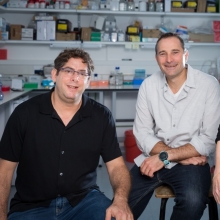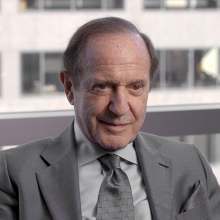EMET Prize to Prof. Yair Reisner
Award honors outstanding achievement in transplantation immunology
Briefs

Prof. Yair Reisner
Prof. Yair Reisner of the Department of Immunology at the Weizmann Institute of Science was chosen as a recipient of the EMET Prize in Life Sciences Bio-Medicine Award for 2019, conferred in Israel by the A.M.N. Foundation. Prof. Reisner developed strategies for overcoming immune barriers in bone marrow transplantation for the treatment of leukemia and other cancers, and has recently suggested novel sources of progenitor cells to treat lung diseases.
Reisner is professor emeritus at the Weizmann Institute, as of 2018. He spent decades investigating numerous aspects of transplantation immunology, and in particular, developing approaches to bone marrow transplantation (BMT) in cancer patients for whom no matched donor is available. He currently runs an active lab at MD Anderson Cancer Center in Houston, Texas, continuing his research.
One of the biggest hurdles in bone marrow transplantation is overcoming the tendency of patients’ immune systems to reject the transplanted marrow. Enabling the use of mis-matched BMT has been a major goal —and a formidable challenge— due to such graft rejection, and due to graft-vs-host disease (GVHD) mediated by donor T cells contaminating the bone marrow inoculum. In a series of advances over the years, Prof. Reisner provided the medical community with novel insights enabling BMT across major genetic barriers—essentially finding ways to trick the immune system into accepting transplants it would otherwise reject, and preventing the bone marrow cells from attacking the patient.
Two of his breakthroughs have already been translated into clinical achievements. Collaborating with Memorial Sloan Kettering Cancer Center in New York in the 1980s, Prof. Reisner found a way to treat babies with severe combined immunodeficiency, or SCID; these children were also known as “bubble babies” because their immune systems are so severely compromised that they had to be raised in plastic chambers, often for months or years on end, to protect them from infection. Prof. Reisner and his medical colleagues used bone marrow from a parent who was a partial match for the patient, and treated it with lectin—a soybean derivative—before transplantation. The lectin binds selectively to the ‘hostile’ mature white blood cells (T cells) in the bone marrow, which can mediate an immune response against the recipient, thereby removing these cells through a process known as T cell depletion. Once cleansed of these hostile cells, the donor’s marrow stem cells could be transplanted without threat of attacking the recipient, enabling development of normal immunity in the patient. Based on this pioneering study, T cell depletion is now used at hospitals around the world, saving untold numbers of lives.
Next, working with hematologist Prof. Massimo Martelli and his medical colleagues in Perugia, Italy, Prof. Reisner attempted to extend the use of T cell-depleted haploidentical HSCT to the treatment of leukemia patients. His initial study showed that despite the pre-treatment of these patients with supra-lethal radiation, graft rejection still presented a major barrier. Subsequently, in a critical second step, he found that graft rejection could be overcome by greatly increasing the dose of hematopoietic progenitors transplanted, an approach termed the “mega dose concept”. Experimental evidence for feasibility was obtained in a murine model, and the technique was then successfully applied to leukemic patients. Many other clinical centers have since adopted this protocol in more than 500 patients. Notably, besides the role of high cell number in facilitating donor hematopoietic stem cell engraftment, Prof. Reisner also showed that ‘megadose’ hematopoietic stem cell transplants overcome rejection through a unique immune regulatory effect on the host immune system, known as the ‘veto’ mechanism. More recently, he further demonstrated that another type of immune-modulating cell, propagated outside the patient, offers exciting new possibilities for safer mis-matched transplants in elderly patients who cannot tolerate highly toxic immune suppression protocols. This technique, requiring only mild conditioning (preparation) of the recipient, could also benefit patients with sickle cell anemia, thalassemia, and a variety of auto-immune diseases, such as type 1 diabetes. A clinical trial using this approach was recently approved by the FDA, and is about to begin at the MD Anderson Cancer Center in Houston.
Prof. Reisner's group has also focused on characterization and potential use of tissue-specific stem cells as a novel cell source for organ regeneration. Very recently, he demonstrated, in mouse models, a new curative approach for treatment of lung diseases based on transplanting specific lung stem cells.
Prof. Reisner earned a BSc degree from the Hebrew University of Jerusalem in 1972, an MSc from the University of California at Berkeley in 1974, and a PhD from the Weizmann Institute of Science in 1978. He worked as a research associate at the Memorial Sloan-Kettering Cancer Center in New York before joining the faculty of the Weizmann Institute in 1981. Prof. Reisner’s recent honors include the DKMS Germany Mechtild Harf Science Award, recognizing distinguished pioneers in the field of hematopoietic stem cell transplantation (2018), the Jaap de Graeff Lecturer Medal from the University of Leiden (2016), the Ernest and Bonnie Beutler Award (2015), and the Rappaport Prize for Biomedical Sciences for a Senior Investigator (2014).








